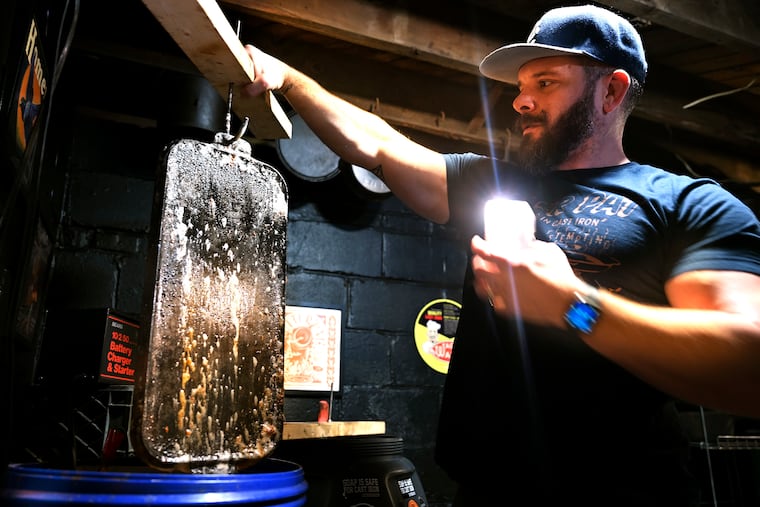Is soap safe for cast iron? A former MMA fighter from N.J. has bet his career on it.
“Yes, you could buy a new one, but you can’t buy your great-grandmother’s cast iron.”

LAWRENCE, N.J. — In a dark corner of Chris Wing’s basement, there are two 55-gallon drums filled with rusty-looking liquids that are fizzing on a Thursday morning. There are also battery chargers sitting on milk crates and plastic bins on the floor filled with chemicals that could, technically, dissolve a body.
Some aspects of Wing’s subterranean business are secret, and with his tattoos, sleeve-stretching biceps, and cauliflower ear from a former life as a mixed martial arts fighter, no one’s prying too hard. But what looks at first like a Breaking Bad sequel in Mercer County is actually something far more wholesome.
Wing, whose fighting nickname was ”Redline,” traded a life of crippling calf kicks and elbow strikes to save rusty cast-iron skillets that are down for the count. Always a cooking enthusiast, Wing received an old, restored skillet as a gift in 2019 and had a revelation about simple, perfect things built to last a lifetime.
“Here’s something that was made maybe 100 years, and it still serves the same purpose, still functions the same exact way, today,“ Wing said. “Name one other thing that’s like that. I can’t really think of anything. Maybe a hammer.”
Wing sold his Bensalem martial arts gym in October and makes a full-time living today as Cast Iron Chris. He restores anything cast iron for customers, posting restoration videos from his basement lab and kitchen for his nearly 600,000-plus followers on Instagram, YouTube, and TikTok. He’ll buy old cast iron and flip it, too.
“When my Instagram blew up, I knew within two months I was closing the gym down,” he said. “That’s how much traffic I got to my website. It was literally life-changing.”
Soap on cast iron
Wing, who lives with his wife, Mallory, and their pets, has a website where he sells chain mail scrubbers, custom seasoning compounds, and even shirts and stickers that espouse his most controversial cast-iron take: soap is safe for cast iron.
“There’s a lot of lore and myths behind cast iron,” he said. “Number one is that you can’t use soap. It drives me crazy.”
Cast-iron owners avoid soap, he said, to keep rust at bay, but the biggest mistake they make is putting them away wet.
“Not drying them enough will be a huge mistake,” he said.
People also believe that oils left behind by cooking somehow season the cast iron. Wing said that just builds layers of crud. Some of the cast iron that gets shipped to him has generational gunk caked on and hardened.
Crud, he said, doesn’t make the food taste better. That’s another myth.
“That’s disgusting,” he said. “It’s not seasoning.”
Cast-iron restoration
Neglected cast iron, however, is where Wing makes money. He declined to say how much he charges but there’s a minimum, he said, and it varies depending on size and condition. Often, it would be cheaper for customers to simply replace a skillet, but Wing said many of the pieces come with stories and seasoned memories.
They’re not just random griddles.
“Yes, you could buy a new one,” he said, “but you can’t buy your great-grandmother’s cast iron. That’s the kind of stuff people send me.”
The restoration process includes an electrolysis bath in the drums to strip off surface rust, along with dips in plastic tubs of Evapo-rust, vinegar, or sodium hydroxide.
“They’re all food grade, food safe,” he said.
Some restorations can take as little as 36 hours, he said, while others can take weeks.
Wing’s restoration shelves and collections include Lodge cast iron from Tennessee, Maryland’s Butter Pat Industries, his personal favorites, and some old-school Griswolds, which were made in Erie for nearly a century. He doesn’t have an outlandish collection, preferring to source cast iron he’ll actually cook on — he makes everything from fried eggs in skillets to pizzas on massive, round griddles. He has cast-iron waffle makers and kettles, too.
“I only cook with cast iron,” he said.
Upstairs, in his home office, however, there’s a 13-inch Griswold skillet hanging on the wall, across from his grandfather’s Remington shotgun. He rescued the skillet from a Philly scrapyard for $25, and today, after restoration, estimated it’s worth $2,000 or more.
“They didn’t make a lot of 13s because of the superstition around unlucky numbers,” he said. “So anytime you find a 13, from any foundry, it’s worth a lot.”
Wing’s holy grail is still out there, though: the Griswold Erie Spider.
“I don’t want to buy it for $5,000,” he said. “I want to find one for $25, all covered in gunk. That’s more fun.”
Wing isn’t the only professional cast-iron restorer in America, or in Mercer County for that matter, but, ever the fighter, he’d put his work up ”against anyone else in the world.”
“What’s nice about this is opening a customer’s box, and seeing some pattern I hadn’t seen before,” he said. “Or sometimes I’ll get a note, with a story, about why this old skillet is so important, and that really keeps me motivated.”